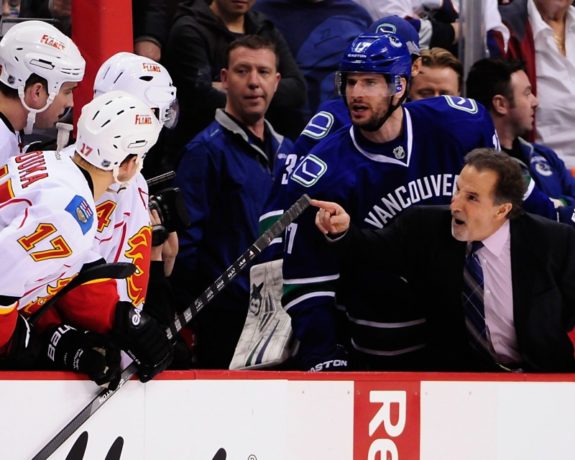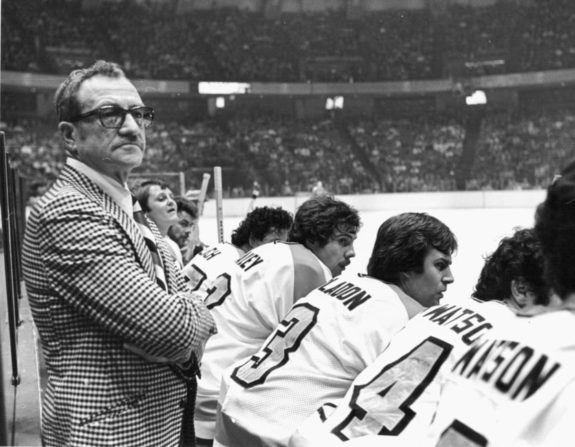John Tortorella has expressed a sense of optimism during the short time since accepting the job as head coach of the Philadelphia Flyers last week. He brings a proven track record as a Stanley Cup champion and a two-time Jack Adams Award winner as the NHL’s coach of the year. In just five days, he has already made a strong first impression by lauding the organization’s history and the passion of its fan base. The buzz surrounding the hire focuses on the effort to change the culture and establish a new identity for a dormant franchise.
Related: Flyers Hire John Tortorella As New Head Coach
Professional sports analysts tend to point to the subjective idea of culture to explain something they don’t know how to quantify, particularly when a team outperforms its perceived level of talent or falls drastically short of its expected goals. What does organizational culture actually mean though? Does a franchise that once identified as the Broad Street Bullies need a renewed culture under their new head coach?
Tortorella Brings Fresh Blood
“I hate using the word culture,” Tortorella stated during his introductory press conference.
His reputation for blunt honesty precedes him. He referred to culture and accountability as “really cool summertime words” that are easy to say and difficult to enact during an NHL season.
“I just call it standard. I want our guys to be proud of themselves. I want you guys. I want our fans to be proud of us, how we look, how we present ourselves, how we attack the game, how we handle situations in the blue paint, and if you’re talking on the ice, how we stick up for each other in certain situations. I want people to be proud of that.”

The Flyers didn’t have much to be proud of in 2020-21 or 2021-22. They lacked attention to detail and any sense of structure in their all-around game. They broke down defensively on a regular basis with careless mistakes and repeatedly failed to break out of their own zone on their way to a last-place finish in the Metropolitan Division.
They allowed a shorthanded goal in the final minute of regulation to concede a one-goal lead against the team that finished with the worst record in the NHL. They gave journeyman Gerry Mayhew the opportunity to play on the power play, only to have him stand on the bench for over 20 seconds while just four Flyers skaters attacked the opposing penalty killers. They allowed a goal on a poorly executed line change from veteran defenseman Keith Yandle who only kept a spot in the lineup for his intangible leadership qualities. They handed two points to the Washington Capitals with an ill-advised giveaway by Ivan Provorov in the final two minutes of a midseason matchup in front of their home crowd.
“Bottom line, I want the team to be harder. I think we need to present ourselves, look harder coming off the bus, coming into buildings. I want other teams to say you know what, we’ve got our hands full tonight.”
That simply hasn’t been the case over the past two seasons or for the majority of the past decade of Flyers hockey.
New Era of Flyers Hockey
As a guest on The Jeff Marek Show, Tortorella impressively articulated key elements to the idea of a new standard that he wishes to set for the Flyers. He gave insight into the “hard to play against” cliche by discussing forechecking, defending the goalie with toughness in the blue paint, and playing with intensity and effort along the walls as tangible opportunities for a team to make things difficult for their opponents.
“It’s a team toughness. It’s just who they (the opponents) think they’re going to play against tonight. How hard of a game is it going to be? I think that’s the closest you can come to if you want to use the word intimidation.”

Despite how much he praised the organization for its history of being a tough team to play against, he made it clear that he wasn’t talking about their willingness to drop the gloves in a brawl at any time. Tortorella has engaged in his fair share of confrontations over the years, but his fierce attitude has never directly correlated with his teams’ propensity to fight.
Marek likened him to Fred Shero, the coach of the fabled Broad Street Bullies of the 1970s, because of the perception of the tough, old-school attitude of both coaches. However, Shero was a progressive hockey mind who became one of the first coaches to incorporate elements of the Russian game into the NHL. He coached the prolific “LCB Line” with Reggie Leach, Bobby Clarke, and Billy Barber and lived off the success of Hall of Fame goaltender Bernie Parent. The intimidating tough guys who made the headlines wouldn’t have been much without an excellent head coach and top-end talent on the roster.
Tortorella similarly brings valuable elements to the organization that can’t be simplified as just an old-school attitude. He preaches accountability and demands the most out of his players, but his ability to build relationships and earn the respect of his players over longer periods of time provides evidence of the fact that he has value in the modern NHL beyond the tough exterior.
Fletcher Looking for Top-End Talent
It’s entirely possible that the Flyers need a full reshaping after the disaster seasons in 2020-21 and 2021-22. While the decision to hire Tortorella addresses the intangible aspect of a team with a losing culture, general manager (GM) Chuck Fletcher will need to pursue the tangible aspect of the issue by closing the gap of talent disparity between the Flyers and teams that qualified for the 2022 Playoffs.
Eight NHL players scored over 100 points in 2021-22. Travis Konecny led the Flyers with 52 points, good for the 119th spot in the league. The Stanley Cup Final features two teams with multiple lines of offensive firepower capable of dominating an NHL game at any given point. Philadelphia showed its lack of top-end offensive skill by finishing 31st in scoring and last in the NHL on the power play in 2021-22.
The plan to become harder to play against and create a new identity won’t work without an infusion of talent onto Philadelphia’s roster. Fletcher will attempt to “aggressively retool” with the hope that the Flyers can reemerge as a Stanley Cup contender. Cap constraints and minimal trade chips will limit his flexibility to overhaul the team in just one offseason, so it might be a longer road ahead than some people might like. However, the Flyers have completed the first step of their plan to infuse a new identity into the fallen franchise.